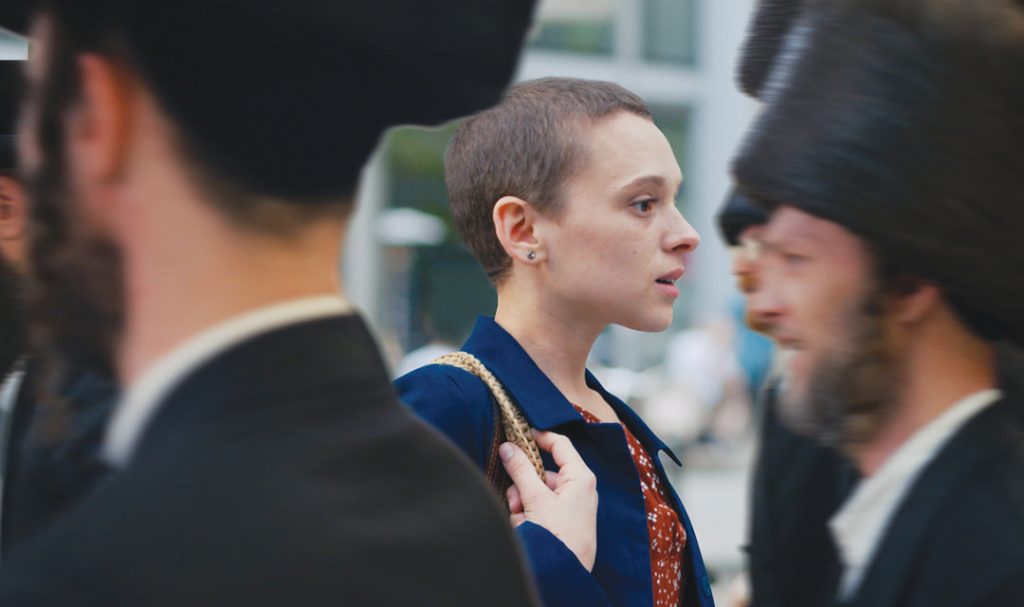(THIS ARTICLE IS MACHINE TRANSLATED by Google from Norwegian)
She decides to run away on a Saturday. The Sabbath is a day of rest in ultra-Orthodox Jewish communities, and the strict rules are a bit softer. But the web of religious restrictions is nevertheless there. She hurriedly left the home empty-handed, carrying only a small sum of cash, a passport and a plane ticket, which she could tuck into the waistband of her long skirt.
Thus, the introduction to the German-American miniseries draws. It is built on Deborah Feldman's own story, which she published in book form in 2012. In the film, she is called Esty. She is 19 years old and grew up in Williamsburg, New York as satmar hasid, one of the most extreme and closed Jewish groups.
Covid-19 has spread at an alarming rate in ultra-Orthodox populations
Self-elected isolation from modern society
Williamsburg, Crown Heights Boro Park and other parts of Brooklyn with large Hasidic populations have recently received some negative attention as core areas for covid-19. The disease has spread at an alarming rate in ultra-Orthodox populations, in both the United States, Israel and other parts of the world, as a result of this sector's self-elected isolation from modern society.
Their only knowledge of the outside world comes from the ultra-Orthodox press, and to keep any dangerous influence at a distance, they surround themselves with strict rules and an endless stream of religious rituals.

That's the reality Esty runs away from. She lives in an arranged marriage. Her gentle husband is under the heavy influence of her dominant mother, and through retrospect we see how Esty was completely unprepared to enter into a relationship. Immediately before the wedding, an adult woman from the neighborhood gave her a measure of sexual guidance, and Esty is terrified to know that her body has an opening where her future husband will penetrate her – and that only Friday night as a part of the ritualized life of the members of the satmar group.
Social stigma
Escape from the ultra-Orthodox lifestyle is extremely difficult. Understandably, it is rare to see a young woman take the step. Social control is strict and there is very little time to think independently. And when you first take the plunge, you venture out into a completely unknown void.
Esty goes to Berlin. Outsiders have given her a plane ticket. She needs to get far and fast. Therefore, the escape takes place as a carefully planned operation. Suddenly she finds herself alone in the German capital. Therefore, she joins a group of young musicians. Some of them are Germans, one is from Yemen, and another is a carefree girl from Israel – the dreaded Zionist enemy in Satmar's narrative.
Together they go out to swim in Wannsee – "It's just a lake!" says the Israeli girl. But for Esty, this is where the Nazis decided on "Die Endlösung" at a short conference in 1942.

Back in Williamsburg, the family is in turmoil. But it is more about their reputation in the neighborhood than about Esty's well-being. Suddenly, her estranged husband, Yanky, realizes what Esty meant when, at their first date, she claimed she was different. His dominant mother is furious with disappointment – over her son, but mostly over Esty. Because when someone leaves the herd in the most extreme parts of ultra-Orthodox society, it leads to violent stigma. Leaving the community is unmistakable evidence of poor upbringing or otherwise failure. The course of marriage intermediaries, who are there to arrange their marriages, is sharply falling.
The women are machines that give birth to children.
Rejectable treatment of women
Israeli actor Amit Rahav, who is convincing in the role of Yanky, also had a prominent role in Stilt, which gained huge viewership when it was streamed Netflix. This Israeli production from 2013 provides a fascinating insight into the ultra-Orthodox environment, and unorthodox do the same thing, albeit in some other way. It may lack drama, and the band of musicians that Esty meets in Berlin may seem more like the kids from Fame than as a genuine group of multicultural youth in Germany by 2020.
But this is not the case. This is about understanding minoritys groups and an extreme lifestyle. The ultra-Orthodox men are just studying the Torah, and the women are machines that give birth to children – that's how the secular Israeli girl formulates. And in one of the flashbacks, Esty is told that it is her duty to make the man feel like a king in bed. She is horrified, as most of us would be.
[ntsu_youtube url = ”https://www.youtube.com/watch?v=-zVhRId0BTw” width = ”520 ″]Nevertheless, the description of the communities in Williamsburg is not blind to the punctual beauty of Hasidic existence – such as the pompous celebrations of the Jewish holidays and the close unity of common goals and identity. This is one of the dilemmas Esty faces, despite her steeled determination to find a better life. For the outside, she is vulnerable and tender-skinned, and that is something we must put behind our ears when we consider fundamentalist groups and condemn them.
Their worldview is conservative, and their treatment of women reprehensible, to name just one example – but our own modern and liberal society is also faced with a number of serious problems. That's one of the reasons why this four-part miniseries is significant.
The series appears on Netflix






